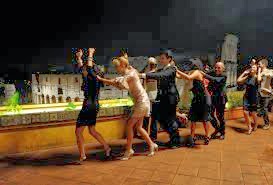La Grande Bellezza or The Great Beauty won the
Best Foreign Film at this year's Academy Awards, and deservingly
so.
I had seen the trailer and as a Fellini fan I was
sold. I expected grand and lush visions of Roma and that's what I got...and so
much more.
This film is not for everyone, it is certainly
Fellini-esque and there is probably a whole other piece I could write on it's
influences and borrowings, but that is unfair to the film and those that are not
familiar with the great master.
Paolo Sorrentino has previously directed The
Consequences of Love and This Must be the Place, both films about journeys of
older men contemplating their lives and trying to make some sense of it all. And
The Great Beauty is ultimately the same exploration, but on a visually larger
and more exquisite scale.
Toni Servillo is Jep, an aging journalist is
living the high life in Rome. He lives in a large apartment overlooking The
Coliseum where he hosts continual parties. On his 65th birthday he feels a shift
in his philosophies when his first love dies; why didn't he write another book
after the success of his first decades earlier, is this lifestyle really
worthwhile, and what is he doing. He questions this with friends and almost
turns on them himself with his sharp wit and acerbic tone. He has regular meals
with his editor, asking her thoughts on his life and their lifestyles. All the
while he continues to navigate his way through a very hedonistic
Rome.
Each scene jolts from one impression of Rome to
another, as seen through Jep's eyes, sometimes with love and beauty, other times
with a more cynical eye. He thinks back to his younger years and the great love
in his life, the one who died, and who ended up marrying his closest friend.
This is a man clearly wanting more out of his life, but what?
As a journalist he is constantly going to
pretentious and crazy events; a magician who can make a Giraffe disappear, a
conceptual artist who screams like a banshee and runs headfirst into a brick
wall, a young child on a stage with buckets of paint making art with her hands
and body, these are all metaphors for the internal pain he is feeling, and the
ridiculous around him.
And then there are his extravagant parties, as he
says, "The trains at our parties are the best in Rome. They're the best cause
they go nowhere." Hmmm, an insight into his mind perhaps!
There is also a thread about the Catholic Church
and an elderly Mother Theresa type nun that Jep is sent to report on. It is
presented with equal parts cynicism, respect, and humour, and culminates in the
most stunningly serene scene with Flamingos!
But mostly the film shows the exceptional beauty
of Rome, he goes to parties and soirees in many abandoned monuments throughout
the eternal city, and wanders cobblestone back streets at night.
The cinematography is breath taking - monuments,
nightlife, costumes, artefacts, ruins, food, beautiful people - everything you
would imagine Rome to be. And the accompanying soundtrack, whilst not Nino Rota
(Fellini's grand maestro) is superb; sweeping opera, instrumental pieces, and
glorious choral vocals.
This is such an elegant, and visually sumptuous
film, and whilst it has a large, strong supporting cast, it is Servillo pulls it
all together with his gentle, and melancholy, yet assured
performance.
The Great Beauty is long at almost two and a half
hours, and I think could have been edited to just under 2 hours easily enough.
But I just adored it, the musings, the melancholy, the joy, the beauty. Make
sure you stay until the very last moment, the footage over the credits is
stunning.





2 comments:
This movie sounds incredible. I am quite determined that his year I will watch Fellini's La Dolce Vita. I feel quite remiss that I haven't!
Oh it was Belinda! I love La Dolce Vita, though La Strada is my favourite. This was a mix of Roma and la Dolce Vita I think! I have heaps of Fellini, if you want to borrow any!
Post a Comment